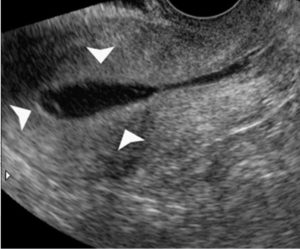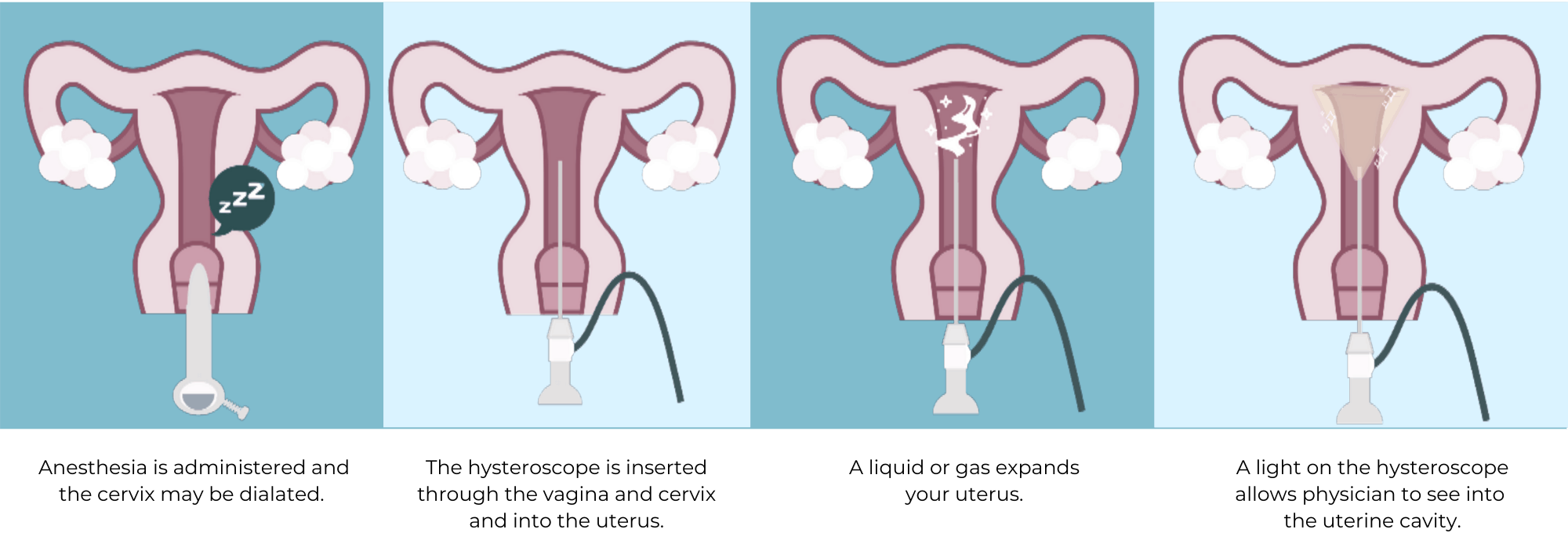Addressing the Uterus
When doing an infertility evaluation, it is important to assess the uterus to check for irregularities. The uterus is made of soft tissue (like the fallopian tubes), so it cannot be seen on a normal X-ray and specialized imaging tests may need to be performed. These include:
SIS (Saline Infusion Sonogram)
What is an SIS?

A Saline Infusion Sonohysterogram (SIS) (SHG) is an ultrasound study of the uterus and uterine lining (endometrium) that identifies abnormalities that may interfere with embryo implantation and fertility. This test is usually covered by medical insurance.
Why would I need an SIS?
An SIS is a must for a transfer cycle to optimize transfer success.
When can I get an SIS?
An SIS is performed in the clinic between 10:00am and 12:00pm. This can be done between days 5-9 of a transfer cycle, so there is no need to wait or waste time.
Do I need to prepare for my SIS?
You will be prescribed a 3–day course of Doxycycline beginning the day before the procedure. Doxycycline is an antibiotic that will help prevent infection. No other preparation is needed for the procedure, and it is not done under any form of sedation. The entire procedure should take no more than 10-15 minutes and should be no more painful than a pap smear.
What should I expect after the procedure?
You should feel well enough afterward to drive yourself home or back to work and may resume normal activities right away.
Expect to have minimal vaginal spotting and some mild cramping.
A small amount of sterile water may leak out as well.
If you develop any fever, unusual pain or heavy vaginal bleeding, call the office immediately for prompt evaluation.
If an abnormality is discovered with this test, corrective surgery may be recommended
A Hysteroscopy (hysto)
What is a hysteroscopy?
A hysteroscopy is a minimally invasive surgery that allows a physician to view the inside of the uterus. The physician can look for uterine growths or scars and may remove them if they are present.
When do I get a hysteroscopy?
This procedure is performed between days 5-9 of the menstrual cycle and is done under IV sedation.
How should I prepare for a hysteroscopy?
To prepare for the IV sedation, one should refrain from eating 6 hours prior to the procedure and refrain from drinking fluids 3 hours prior to the procedure. Additionally, you will be prescribed a 7-day course of Doxycycline, which is an antibiotic to help prevent infection.
What should I expect after the procedure?
After the procedure, a nurse will monitor you for about an hour as you recover from the IV sedation.
The most common side effects from IV sedation are nausea and drowsiness.
You may experience spotting or bleeding for the next 7-10 days, this is normal. Spotting or bleeding may stop and restart during this time. Do not use a tampon, instead use a sanitary pad or panty liner in order to assess the bleeding.
It is normal to have mild to moderate lower abdominal cramps (similar to menstrual cramps). This is best treated with Tylenol (Acetaminophen) or Motrin/Advil (Ibuprofen) which are sold over the counter. You may take up to 1000mg of Acetaminophen every 6 hours (if you have any kidney problems you make take up to 500mg of Acetaminophen every 6 hours) and 600mg of Ibuprofen every 6-8 hours. The two medications may overlap, as long as they are taken 2 hours apart.
Endometrial Receptivity Analysis (ERA)
What is an ERA?
An Endometrial Receptivity Analysis (ERA) is a procedure done to determine when your uterus is the most receptive to embryo implantation. The ERA only benefits about 1 in 10 patients, and is only beneficial to patients who will have a future frozen embryo transfer (FET). This procedure cannot be done to determine receptivity for a fresh embryo transfer after an IVF cycle.
How long will an ERA take?


An ERA takes an entire cycle, including all medications that would be taken during a transfer cycle. The procedure is performed at the end of the cycle, when the embryo transfer would take place.
How should I prepare for an ERA?
No preparation is required for the procedure itself, and it is not done under any form of sedation.
What happens after the procedure?
The sample taken during the biopsy is sent to an outside lab (Igenomix) to assess the endometrial receptivity of the sample. Mild discomfort and cramping may be experienced while the biopsy is performed.
After the procedure, you should expect a period in the next 7-10 days. At this time, you may start preparation for a frozen embryo transfer (FET) cycle, using the same medications as in the ERA cycle.
What do my results mean?
Pre-receptive: This indicates that at the time the endometrial biopsy was taken, the endometrium was not yet ready to receive a potential embryo and transfer at this time may not be optimal.
Receptive: This indicates that the time the endometrial biopsy was taken was an optimal time to transfer an embryo.
Post-receptive: This indicates that at the time the endometrial biopsy was taken, the endometrium had already reached the stage for optimal embryo transfer and gone past it.
We always take into account your ERA results when we schedule your FET.
How much is an ERA?
Unfortunately, this procedure is NEVER covered by insurance.
The fee for the ERA test is $1,400:
- $800 is the procedural fee paid to Generation Next Fertility
- $600 is for the biopsy examination fee that is paid to Igenomix
If this test is performed, the fee of $1,400 will be due on the day of the procedure. Please be advised if payment is not received in full, the procedure will be canceled.



